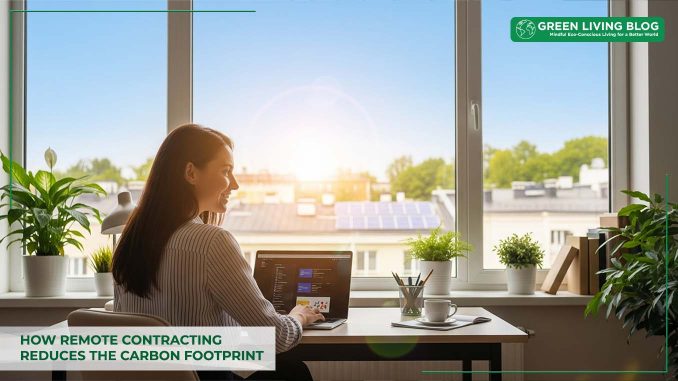
Working from home might feel like a personal win, but it’s also a quiet win for the planet.
No train rides, no office heaters blasting all day, and no long traffic queues to sit through.
If you’re a UK contractor using an umbrella company, you’re already in a setup that saves more carbon than you think.
Let’s break it down simply and clearly.
Why remote contracting is greener than you think

You cut emissions the minute you stop commuting. You don’t drive, don’t take the train, and don’t burn fuel just sitting at a desk elsewhere. When you’re a remote contractor using a UK umbrella payroll provider, you’re cutting out more than just travel. You’re also skipping office energy, paper-heavy admin, and in-person meetings. That all adds up to real carbon savings without changing how you work.
The truth is, when you work from home under an umbrella company, you avoid some of the biggest energy drains in modern office life. You get paid through PAYE, skip paperwork, and don’t run up extra costs by renting an office. That’s a win for you and for the air outside your window.
What the data shows about emissions from working remotely

Working remotely isn’t just good for your time. It’s also good for the air. Let’s look at what real numbers say.
Research shows that full-time remote work can cut personal work-related emissions by up to 54%. Even working from home just two days a week can bring that number down by 11% to 29%. That means just a couple of remote days per week does more for the environment than switching to paper straws ever will.
During the UK lockdowns, transport emissions dropped by more than 10%, mostly because fewer people were heading to offices. No cars, no trains, no packed buses. That shift alone made a visible difference in air quality across cities.
The impact is even bigger when companies reduce office space. Fewer buildings running lights, heating, and cooling systems all day long means less energy demand. So, when thousands of contractors like you work remotely under umbrella companies, the savings stack up fast.
But there’s more to it than just skipping the train.
What’s better — home or office?

Working from home uses less carbon overall, but you’ve got to stay smart about how you do it. Office buildings are energy hogs, but a wasteful home setup can eat into the gains.
Let’s break it into simple pieces.
Why remote work helps:
- You don’t commute. Less fuel, fewer emissions, less traffic.
- Your umbrella company doesn’t need a physical office for you. No lighting, no aircon, no energy bills on your behalf.
- No face-to-face meetings means no business travel or overnight hotel stays, just to show up and shake hands.
- Most umbrella companies run paperless and digital payroll. You don’t print pay slips or invoices, and they don’t send you post.
What you still need to watch:
- Your home energy use might go up. If you leave lights and heating on all day, you’re wasting the carbon you just saved.
- Hybrid work is tricky. If you’re at home some days but your company keeps the office running for you anyway, that can increase energy use.
- Some people replace commutes with extra trips during the day. That adds fuel back in without the work part.
The main thing is to treat your home office like an actual office. Keep it energy smart. Turn things off when you’re not using them. Use daylight when you can. And avoid turning on the kettle every ten minutes just because it’s within reach.
What makes umbrella contracting even greener

Umbrella companies make contracting cleaner by cutting paperwork, reducing office needs, and moving everything online.
Here’s what makes a difference:
- Most umbrella companies don’t run large offices. They don’t need to. Everything is handled through payroll software, direct bank transfers, and cloud-based admin. That’s fewer buildings, fewer printers, and fewer supplies. You don’t need to show up anywhere physically to get paid.
- You don’t file your own invoices or deal with manual tax records. The umbrella does it all under PAYE. That cuts down on accountant visits, posted paperwork, and printed documents.
- Even contracts and onboarding are now done through portals and email. That’s fewer courier miles and almost no paper waste. If your umbrella company runs clean digital systems, your carbon output from admin drops without you even noticing.
- If you had to run your own limited company, you’d likely need an accountant, office space for records, and more printed paperwork. You’d also travel for bank meetings or hand-delivered documents in some cases. So switching to umbrella setups saves time and carbon without needing to change your workflow.
Top 3 questions about remote work, contracting and carbon savings
1. Is remote contracting always greener?
Yes, full-time remote contracting cuts emissions more than office-based work, if you keep your home energy use efficient and avoid unnecessary travel.
Remote contracting reduces carbon through less commuting, no office energy use, and fewer physical admin tasks. It’s a simple way to cut impact if done right. The biggest gains come when you stay home most days and keep energy smart at home.
2. Do umbrella companies reduce resource use?
Yes, most umbrella companies rely on digital systems that avoid paper, cut back office space, and remove the need for physical meetings.
Because umbrella companies centralise admin for hundreds of contractors, they avoid the duplication you’d get if every contractor ran a separate limited company. That means less use of energy, buildings, paper, and office materials across the board.
3. What’s the best way to stay eco-conscious while contracting?
Work fully remote where possible, limit printing, reduce travel for meetings, and make sure your home office is energy efficient.
Little things make a big difference. Use LED lights. Set a timer on heating. Don’t leave your laptop plugged in all day. Keep files digital. If you’re working under an umbrella, keep all paperwork online and avoid printing anything unless legally required.
Final thought: Carbon-saving work doesn’t have to be hard
You don’t have to wear hemp clothes or give up showers to help the planet and reduce your carbon footprint. You just need to skip the commute, work from home, and choose simple setups like umbrella contracting that already run paperless and remote-first.
When you combine smart contracting with full-time remote work, you cut emissions without lifting a finger. That’s not a lifestyle change — that’s just good sense. You keep getting paid, keep doing your job, and still do your part.
If everyone did that, the air would be cleaner before the week’s over.
![]()
Author Profile
- Online Media & PR Strategist
- Blogger and Educator by Passion | Senior Online Media & PR Strategist at ClickDo Ltd. | Fascinated to Write Lifestyle Blogs in News & Education I have completed a journalism summer course at the London School of Journalism and manage various blogs.
Latest entries
 Green ShoppingJanuary 20, 20266 UK Brands Offering Sustainable Gifts All Year Round
Green ShoppingJanuary 20, 20266 UK Brands Offering Sustainable Gifts All Year Round BusinessOctober 29, 2025Top 6 UK Government Green Funds & Grants for SMEs
BusinessOctober 29, 2025Top 6 UK Government Green Funds & Grants for SMEs List postOctober 16, 202510 Best Green Hosting Services in the UK
List postOctober 16, 202510 Best Green Hosting Services in the UK BusinessSeptember 9, 2025Top 5 Eco Certifications & Their Impact on Greener Businesses
BusinessSeptember 9, 2025Top 5 Eco Certifications & Their Impact on Greener Businesses






Leave a Reply
You must be logged in to post a comment.